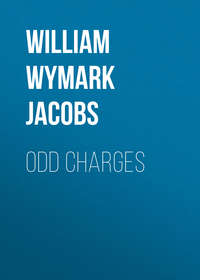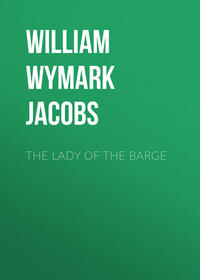 полная версия
полная версияShort Cruises
Bob Pretty pretended not to hear ‘im.
“Where did your wife get the money to buy that bonnet she ‘ad on on Sunday?” ses Bill Chambers. “My wife ses it’s the fust new bonnet she has ‘ad since she was married.”
“And where did the new winder curtains come from?” ses Peter Gubbins.
Bob Pretty drank up ‘is beer and stood looking at them very thoughtful; then he opened the door and went out without saying a word.
“He’s got your great-uncle a prisoner in his ‘ouse, Henery,” ses Bill Chambers; “it’s easy for to see that the pore old gentleman is getting past things, and I shouldn’t wonder if Bob Pretty don’t make ‘im leave all ‘is money to ‘im.”
Henery Walker started raving ag’in, and for the next few days he tried his ‘ardest to get a few words with ‘is great-uncle, but Bob Pretty was too much for ‘im. Everybody in Claybury said wot a shame it was, but it was all no good, and Henery Walker used to leave ‘is work and stand outside Bob Pretty’s for hours at a time in the ‘opes of getting a word with the old man.
He got ‘is chance at last, in quite a unexpected way. We was up ‘ere at the “Cauliflower” one evening, and, as it ‘appened, we was talking about Henery Walker’s great-uncle, when the door opened, and who should walk in but the old gentleman ‘imself. Everybody left off talking and stared at ‘im, but he walked up to the bar and ordered a glass o’ gin and beer as comfortable as you please.
Bill Chambers was the fust to get ‘is presence of mind back, and he set off arter Henery Walker as fast as ‘is legs could carry ‘im, and in a wunnerful short time, considering, he came back with’ Henery, both of ‘em puffing and blowing their ‘ardest.
“There—he—is!” ses Bill Chambers, pointing to the old gentleman.
Henery Walker gave one look, and then ‘e slipped over to the old man and stood all of a tremble, smiling at ‘im. “Good-evening,” he ses.
“Wot?” ses the old gentleman.
“Good-evening!” ses Henery Walker ag’in.
“I’m a bit deaf,” ses the old gentleman, putting his ‘and to his ear.
“Good-evening!” ses Henery Walker ag’in, shouting. “I’m your grand-nephew, Henery Walker!”
“Ho, are you?” ses the old gentleman, not at all surprised. “Bob Pretty was telling me all about you.”
“I ‘ope you didn’t listen to ‘im,” ses Henery, Walker, all of a tremble. “Bob Pretty’d say anything except his prayers.”
“He ses you’re arter my money,” ses the old gentleman, looking at ‘im.
“He’s a liar, then,” ses Henery Walker; “he’s arter it ‘imself. And it ain’t a respectable place for you to stay at. Anybody’ll tell you wot a rascal Bob Pretty is. Why, he’s a byword.”
“Everybody is arter my money,” ses the old gentleman, looking round. “Everybody.”
“I ‘ope you’ll know me better afore you’ve done with me, uncle,” ses Henery Walker, taking a seat alongside of ‘im. “Will you ‘ave another mug o’ beer?”
“Gin and beer,” ses the old gentleman, cocking his eye up very fierce at Smith, the landlord; “and mind the gin don’t get out ag’in, same as it did in the last.”
Smith asked ‘im wot he meant, but ‘is deafness come on ag’in. Henery Walker ‘ad an extra dose o’ gin put in, and arter he ‘ad tasted it the old gentleman seemed to get more amiable-like, and ‘im and Henery Walker sat by theirselves talking quite comfortable.
“Why not come and stay with me?” ses Henery Walker, at last. “You can do as you please and have the best of everything.”
“Bob Pretty ses you’re arter my money,” ses the old gentleman, shaking his ‘ead. “I couldn’t trust you.”
“He ses that to put you ag’in me,” ses Henery Walker, pleading-like.
“Well, wot do you want me to come and live with you for, then?” ses old Mr. Walker.
“Because you’re my great-uncle,” ses Henery Walker, “and my ‘ouse is the proper place for you. Blood is thicker than water.”
“And you don’t want my money?” ses the old man, looking at ‘im very sharp.
“Certainly not,” ses Henery Walker.
“And ‘ow much ‘ave I got to pay a week?” ses old Mr. Walker. “That’s the question?”
“Pay?” ses Henery Walker, speaking afore he ‘ad time to think. “Pay? Why, I don’t want you to pay anything.”
The old gentleman said as ‘ow he’d think it over, and Henery started to talk to ‘im about his father and an old aunt named Maria, but ‘e stopped ‘im sharp, and said he was sick and tired of the whole Walker family, and didn’t want to ‘ear their names ag’in as long as he lived. Henery Walker began to talk about Australey then, and asked ‘im ‘ow many sheep he’d got, and the words was ‘ardly out of ‘is mouth afore the old gentleman stood up and said he was arter his money ag’in.
Henery Walker at once gave ‘im some more gin and beer, and arter he ‘ad drunk it the old gentleman said that he’d go and live with ‘im for a little while to see ‘ow he liked it.
“But I sha’n’t pay anything,” he ses, very sharp; “mind that.”
“I wouldn’t take it if you offered it to me,” ses Henery Walker. “You’ll come straight ‘ome with me to-night, won’t you?”
Afore old Mr. Walker could answer the door opened and in came Bob Pretty. He gave one look at Henery Walker and then he walked straight over to the old gentleman and put his ‘and on his shoulder.
“Why, I’ve been looking for you everywhere, Mr. Walker,” he ses. “I couldn’t think wot had ‘appened to you.”
“You needn’t worry yourself, Bob,” ses Henery Walker; “he’s coming to live with me now.”
“Don’t you believe it,” ses Bob Pretty, taking hold of old Mr. Walker by the arm; “he’s my lodger, and he’s coming with me.”
He began to lead the old gentleman towards the door, but Henery Walker, wot was still sitting down, threw ‘is arms round his legs and held ‘im tight. Bob Pretty pulled one way and Henery Walker pulled the other, and both of ‘em shouted to each other to leave go. The row they made was awful, but old Mr. Walker made more noise than the two of ‘em put together.
“You leave go o’ my lodger,” ses Bob Pretty.
“You leave go o’ my great-uncle—my dear great-uncle,” ses Henery Walker, as the old gentleman called ‘im a bad name and asked ‘im whether he thought he was made of iron.
I believe they’d ha’ been at it till closing-time, on’y Smith, the landlord, came running in from the back and told them to go outside. He ‘ad to shout to make ‘imself heard, and all four of ‘em seemed to be trying which could make the most noise.
“He’s my lodger,” ses Bob Pretty, “and he can’t go without giving me proper notice; that’s the lor—a week’s notice.”
They all shouted ag’in then, and at last the old gentleman told Henery Walker to give Bob Pretty ten shillings for the week’s notice and ha’ done with ‘im. Henery Walker ‘ad only got four shillings with ‘im, but ‘e borrowed the rest from Smith, and arter he ‘ad told Bob Pretty wot he thought of ‘im he took old Mr. Walker by the arm and led him ‘ome a’most dancing for joy.
Mrs. Walker was nearly as pleased as wot ‘e was, and the fuss they made of the old gentleman was sinful a’most. He ‘ad to speak about it ‘imself at last, and he told ‘em plain that when ‘e wanted arf-a-dozen sore-eyed children to be brought down in their night-gowns to kiss ‘im while he was eating sausages, he’d say so.
Arter that Mrs. Walker was afraid that ‘e might object when her and her ‘usband gave up their bedroom to ‘im; but he didn’t. He took it all as ‘is right, and when Henery Walker, who was sleeping in the next room with three of ‘is boys, fell out o’ bed for the second time, he got up and rapped on the wall.
Bob Pretty came round the next morning with a t tin box that belonged to the old man, and ‘e was so perlite and nice to ‘im that Henery Walker could see that he ‘ad ‘opes of getting ‘im back ag’in. The box was carried upstairs and put under old Mr. Walker’s bed, and ‘e was so partikler about its being locked, and about nobody being about when ‘e opened it, that Mrs. Walker went arf out of her mind with curiosity.
“I s’pose you’ve looked to see that Bob Pretty didn’t take anything out of it?” ses Henery Walker.
“He didn’t ‘ave the chance,” ses the old gentleman. “It’s always kep’ locked.”
“It’s a box that looks as though it might ‘ave been made in Australey,” ses Henery Walker, who was longing to talk about them parts.
“If you say another word about Australey to me,” ses old Mr. Walker, firing up, “off I go. Mind that! You’re arter my money, and if you’re not careful you sha’n’t ‘ave a farthing of it.”
That was the last time the word “Australey” passed Henery Walker’s lips, and even when ‘e saw his great-uncle writing letters there he didn’t say anything. And the old man was so suspicious of Mrs. Walker’s curiosity that all the letters that was wrote to ‘im he ‘ad sent to Bob Pretty’s. He used to call there pretty near every morning to see whether any ‘ad come for ‘im.
In three months Henery Walker ‘adn’t seen the color of ‘is money once, and, wot was worse still, he took to giving Henery’s things away. Mrs. Walker ‘ad been complaining for some time of ‘ow bad the hens had been laying, and one morning at breakfast-time she told her ‘usband that, besides missing eggs, two of ‘er best hens ‘ad been stolen in the night.
“They wasn’t stolen,” ses old Mr. Walker, putting down ‘is teacup. “I took ‘em round this morning and give ‘em to Bob Pretty.”
“Give ‘em to Bob Pretty?” ses Henery Walker, arf choking. “Wot for?”
“‘Cos he asked me for ‘em,” ses the old gentleman. “Wot are you looking at me like that for?”
Henery couldn’t answer ‘im, and the old gentleman, looking very fierce, got up from the table and told Mrs. Walker to give ‘im his hat. Henery Walker clung to ‘im with tears in his eyes a’most and begged ‘im not to go, and arter a lot of talk old Mr. Walker said he’d look over it this time, but it mustn’t occur ag’in.
Arter that ‘e did as ‘e liked with Henery Walker’s things, and Henery dursen’t say a word to ‘im. Bob Pretty used to come up and flatter ‘im and beg ‘im to go back and lodge with ‘im, and Henery was so afraid he’d go that he didn’t say a word when old Mr. Walker used to give Bob Pretty things to make up for ‘is disappointment. He ‘eard on the quiet from Bill Chambers, who said that the old man ‘ad told it to Bob Pretty as a dead secret, that ‘e ‘ad left ‘im all his money, and he was ready to put up with anything.
The old man must ha’ been living with Henery Walker for over eighteen months when one night he passed away in ‘is sleep. Henery knew that his ‘art was wrong, because he ‘ad just paid Dr. Green ‘is bill for saying that ‘e couldn’t do anything for ‘im, but it was a surprise to ‘im all the same. He blew his nose ‘ard and Mrs. Walker kept rubbing ‘er eyes with her apron while they talked in whispers and wondered ‘ow much money they ‘ad come in for?
In less than ten minutes the news was all over Clay-bury, and arf the people in the place hanging round in front of the ‘ouse waiting to hear ‘ow much the Walkers ‘ad come in for. Henery Walker pulled the blind on one side for a moment and shook his ‘ead at them to go away. Some of them did go back a yard or two, and then they stood staring at Bob Pretty, wot come up as bold as brass and knocked at the door.
“Wot’s this I ‘ear?” he ses, when Henery Walker opened it. “You don’t mean to tell me that the pore old gentleman has really gone? I told ‘im wot would happen if ‘e came to lodge with you.”
“You be off,” ses Henery Walker; “he hasn’t left you anything.”
“I know that,” ses Bob Pretty, shaking his ‘ead. “You’re welcome to it, Henery, if there is anything. I never bore any malice to you for taking of ‘im away from us. I could see you’d took a fancy to ‘im from the fust. The way you pretended ‘e was your great-uncle showed me that.”
“Wot are you talking about?” ses Henery Walker. “He was my great-uncle!”
“Have it your own way, Henery,” ses Bob Pretty; “on’y, if you asked me, I should say that he was my wife’s grandfather.”
“Your—wife’s—grandfather?” ses Henery Walker, in a choking voice.
He stood staring at ‘im, stupid-like, for a minute or two, but he couldn’t get out another word. In a flash ‘e saw ‘ow he’d been done, and how Bob Pretty ‘ad been deceiving ‘im all along, and the idea that he ‘ad arf ruined himself keeping Mrs. Pretty’s grandfather for ‘em pretty near sent ‘im out of his mind.
“But how is it ‘is name was Josiah Walker, same as Henery’s great-uncle?” ses Bill Chambers, who ‘ad been crowding round with the others. “Tell me that!”
“He ‘ad a fancy for it,” ses Bob Pretty, “and being a ‘armless amusement we let him ‘ave his own way. I told Henery Walker over and over ag’in that it wasn’t his uncle, but he wouldn’t believe me. I’ve got witnesses to it. Wot did you say, Henery?”
Henery Walker drew ‘imself up as tall as he could and stared at him. Twice he opened ‘is mouth to speak but couldn’t, and then he made a odd sort o’ choking noise in his throat, and slammed the door in Bob Pretty’s face.
A LOVE-KNOT
MR. NATHANIEL CLARK and Mrs. Bowman had just finished their third game of draughts. It had been a difficult game for Mr. Clark, the lady’s mind having been so occupied with other matters that he had had great difficulty in losing. Indeed, it was only by pushing an occasional piece of his own off the board that he had succeeded.
“A penny for your thoughts, Amelia,” he said, at last.
Mrs. Bowman smiled faintly. “They were far away,” she confessed.
Mr. Clark assumed an expression of great solemnity; allusions of this kind to the late Mr. Bowman were only too frequent. He was fortunate when they did not grow into reminiscences of a career too blameless for successful imitation.
“I suppose,” said the widow, slowly—“I suppose I ought to tell you: I’ve had a letter.”
Mr. Clark’s face relaxed.
“It took me back to the old scenes,” continued Mrs. Bowman, dreamily. “I have never kept anything back from you, Nathaniel. I told you all about the first man I ever thought anything of—Charlie Tucker?”
Mr. Clark cleared his throat. “You did,” he said, a trifle hoarsely. “More than once.”
“I’ve just had a letter from him,” said Mrs. Bowman, simpering. “Fancy, after all these years! Poor fellow, he has only just heard of my husband’s death, and, by the way he writes—”
She broke off and drummed nervously on the table.
“He hasn’t heard about me, you mean,” said Mr. Clark, after waiting to give her time to finish.
“How should he?” said the widow.
“If he heard one thing, he might have heard the other,” retorted Mr. Clark. “Better write and tell him. Tell him that in six weeks’ time you’ll be Mrs. Clark. Then, perhaps, he won’t write again.”
Mrs. Bowman sighed. “I thought, after all these years, that he must be dead,” she said, slowly, “or else married. But he says in his letter that he has kept single for my sake all these years.”
“Well, he’ll be able to go on doing it,” said Mr. Clark; “it’ll come easy to him after so much practice.”
“He—he says in his letter that he is coming to see me,” said the widow, in a low voice, “to—to—this evening.”
“Coming to see you?” repeated Mr. Clark, sharply. “What for?”
“To talk over old times, he says,” was the reply. “I expect he has altered a great deal; he was a fine-looking fellow—and so dashing. After I gave him up he didn’t care what he did. The last I heard of him he had gone abroad.”
Mr. Clark muttered something under his breath, and, in a mechanical fashion, began to build little castles with the draughts. He was just about to add to an already swaying structure when a thundering rat-tat-tat at the door dispersed the draughts to the four corners of the room. The servant opened the door, and the next moment ushered in Mrs. Bowman’s visitor.
A tall, good-looking man in a frock-coat, with a huge spray of mignonette in his button-hole, met the critical gaze of Mr. Clark. He paused at the door and, striking an attitude, pronounced in tones of great amazement the Christian name of the lady of the house.
“Mr. Tucker!” said the widow, blushing.
“The same girl,” said the visitor, looking round wildly, “the same as the day she left me. Not a bit changed; not a hair different.”
He took her extended hand and, bending over it, kissed it respectfully.
“It’s—it’s very strange to see you again, Mr. Tucker,” said Mrs. Bowman, withdrawing her hand in some confusion.
“Mr. Tucker!” said that gentleman, reproachfully; “it used to be Charlie.”
Mrs. Bowman blushed again, and, with a side glance at the frowning Mr. Clark, called her visitor’s attention to him and introduced them. The gentlemen shook hands stiffly.
“Any friend of yours is a friend of mine,” said Mr. Tucker, with a patronizing air. “How are you, sir?”
Mr. Clark replied that he was well, and, after some hesitation, said that he hoped he was the same. Mr. Tucker took a chair and, leaning back, stroked his huge mustache and devoured the widow with his eyes. “Fancy seeing you again!” said the latter, in some embarrassment. “How did you find me out?”
“It’s a long story,” replied the visitor, “but I always had the idea that we should meet again. Your photograph has been with me all over the world. In the backwoods of Canada, in the bush of Australia, it has been my one comfort and guiding star. If ever I was tempted to do wrong, I used to take your photograph out and look at it.”
“I s’pose you took it out pretty often?” said Mr. Clark, restlessly. “To look at, I mean,” he added, hastily, as Mrs. Bowman gave him an indignant glance.
“Every day,” said the visitor, solemnly. “Once when I injured myself out hunting, and was five days without food or drink, it was the only thing that kept me alive.”
Mr. Clark’s gibe as to the size of the photograph was lost in Mrs. Bowman’s exclamations of pity.
“I once lived on two ounces of gruel and a cup of milk a day for ten days,” he said, trying to catch the widow’s eye. “After the ten days—”
“When the Indians found me I was delirious,” continued Mr. Tucker, in a hushed voice, “and when I came to my senses I found that they were calling me ‘Amelia.’”
Mr. Clark attempted to relieve the situation by a jocose inquiry as to whether he was wearing a mustache at the time, but Mrs. Bowman frowned him down. He began to whistle under his breath, and Mrs. Bowman promptly said, “H’sh!”
“But how did you discover me?” she inquired, turning again to the visitor.
“Wandering over the world,” continued Mr. Tucker, “here to-day and there to-morrow, and unable to settle down anywhere, I returned to North-town about two years ago. Three days since, in a tramcar, I heard your name mentioned. I pricked up my ears and listened; when I heard that you were free I could hardly contain myself. I got into conversation with the lady and obtained your address, and after travelling fourteen hours here I am.”
“How very extraordinary!” said the widow. “I wonder who it could have been? Did she mention her name?”
Mr. Tucker shook his head. Inquiries as to the lady’s appearance, age, and dress were alike fruitless. “There was a mist before my eyes,” he explained. “I couldn’t realize it. I couldn’t believe in my good fortune.”
“I can’t think—” began Mrs. Bowman.
“What does it matter?” inquired Mr. Tucker, softly. “Here we are together again, with life all before us and the misunderstandings of long ago all forgotten.”
Mr. Clark cleared his throat preparatory to speech, but a peremptory glance from Mrs. Bowman restrained him.
“I thought you were dead,” she said, turning to the smiling Mr. Tucker. “I never dreamed of seeing you again.”
“Nobody would,” chimed in Mr. Clark. “When do you go back?”
“Back?” said the visitor. “Where?”
“Australia,” replied Mr. Clark, with a glance of defiance at the widow. “You must ha’ been missed a great deal all this time.”
Mr. Tucker regarded him with a haughty stare. Then he bent towards Mrs. Bowman.
“Do you wish me to go back?” he asked, impressively.
“We don’t wish either one way or the other,” said Mr. Clark, before the widow could speak. “It don’t matter to us.”
“We?” said Mr. Tucker, knitting his brows and gazing anxiously at Mrs. Bowman. “We?”
“We are going to be married in six weeks’ time,” said Mr. Clark.
Mr. Tucker looked from one to the other in silent misery; then, shielding his eyes with his hand, he averted his head. Mrs. Bowman, with her hands folded in her lap, regarded him with anxious solicitude.
“I thought perhaps you ought to know,” said Mr. Clark.
Mr. Tucker sat bolt upright and gazed at him fixedly. “I wish you joy,” he said, in a hollow voice.
“Thankee,” said Mr. Clark; “we expect to be pretty happy.” He smiled at Mrs. Bowman, but she made no response. Her looks wandered from one to the other—from the good-looking, interesting companion of her youth to the short, prosaic little man who was exulting only too plainly in his discomfiture.
Mr. Tucker rose with a sigh. “Good-by,” he said, extending his hand.
“You are not going—yet?” said the widow.
Mr. Tucker’s low-breathed “I must” was just audible. The widow renewed her expostulations.
“Perhaps he has got a train to catch,” said the thoughtful Mr. Clark.
“No, sir,” said Mr. Tucker. “As a matter of fact, I had taken a room at the George Hotel for a week, but I suppose I had better get back home again.”
“No; why should you?” said Mrs. Bowman, with a rebellious glance at Mr. Clark. “Stay, and come in and see me sometimes and talk over old times. And Mr. Clark will be glad to see you, I’m sure. Won’t you Nath—Mr. Clark?”
“I shall be—delighted,” said Mr. Clark, staring hard at the mantelpiece. “Delighted.”
Mr. Tucker thanked them both, and after groping for some time for the hand of Mr. Clark, who was still intent upon the mantelpiece, pressed it warmly and withdrew. Mrs. Bowman saw him to the door, and a low-voiced colloquy, in which Mr. Clark caught the word “afternoon,” ensued. By the time the widow returned to the room he was busy building with the draughts again.
Mr. Tucker came the next day at three o’clock, and the day after at two. On the third morning he took Mrs. Bowman out for a walk, airily explaining to Mr. Clark, who met them on the way, that they had come out to call for him. The day after, when Mr. Clark met them returning from a walk, he was assured that his silence of the day before was understood to indicate a distaste for exercise.
“And, you see, I like a long walk,” said Mrs. Bowman, “and you are not what I should call a good walker.”
“You never used to complain,” said Mr. Clark; “in fact, it was generally you that used to suggest turning back.”
“She wants to be amused as well,” remarked Mr. Tucker; “then she doesn’t feel the fatigue.”
Mr. Clark glared at him, and then, shortly declining Mrs. Bowman’s invitation to accompany them home, on the ground that he required exercise, proceeded on his way. He carried himself so stiffly, and his manner was so fierce, that a well-meaning neighbor who had crossed the road to join him, and offer a little sympathy if occasion offered, talked of the weather for five minutes and inconsequently faded away at a corner.
Trimington as a whole watched the affair with amusement, although Mr. Clark’s friends adopted an inflection of voice in speaking to him which reminded him strongly of funerals. Mr. Tucker’s week was up, but the landlord of the George was responsible for the statement that he had postponed his departure indefinitely.
Matters being in this state, Mr. Clark went round to the widow’s one evening with the air of a man who has made up his mind to decisive action. He entered the room with a bounce and, hardly deigning to notice the greeting of Mr. Tucker, planted himself in a chair and surveyed him grimly. “I thought I should find you here,” he remarked.
“Well, I always am here, ain’t I?” retorted Mr. Tucker, removing his cigar and regarding him with mild surprise.
“Mr. Tucker is my friend,” interposed Mrs. Bowman. “I am the only friend he has got in Trimington. It’s natural he should be here.”
Mr. Clark quailed at her glance.
“People are beginning to talk,” he muttered, feebly.
“Talk?” said the widow, with an air of mystification belied by her color. “What about?”
Mr. Clark quailed again. “About—about our wedding,” he stammered.
Mr. Tucker and the widow exchanged glances. Then the former took his cigar from his mouth and, with a hopeless gesture threw it into the grate.
“Plenty of time to talk about that,” said Mrs. Bowman, after a pause.









